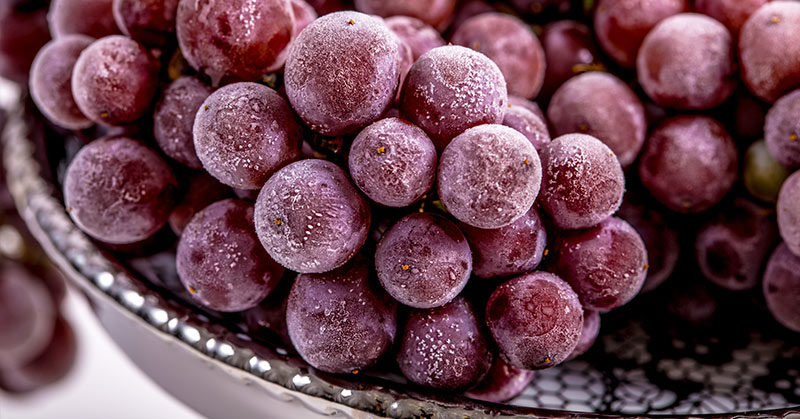Food shopping has become complicated with the current pandemic. Between the stressful environment and the risk of contamination, many people would prefer to do larger shops and push off the trip as long as they could. Unfortunately, some foods won’t keep for long and create a need for another grocery run.
9 Surprising Foods You Can Freeze

However, if you have any of these nine items on your list, get ready to buy in bulk because these foods could be frozen and used later. Don’t worry, they won’t lose any flavor, and this method can save the pain of throwing out excess food. Aside from preserving food, freezing can turn some of these items into a new type of treat to enjoy. For more information on how long food can stay fresh in the freezer, check out the FoodKeeper App authorized by the United States government. Say goodbye to needless waste and extra grocery runs!
Read More: Prediabetes Diet: 10 Foods To Limit and 10 To Enjoy
Garlic

Opposed to some of the other more temperamental items on this list, garlic is very easygoing when frozen. You can freeze the whole bulb and remove cloves as needed. Or you can peel the cloves and freeze them whole, or slice or mince them first. Alternatively, you can pack the crushed garlic in olive oil. The oil won’t freeze so you can spoon out as much garlic-infused oil as you need, whenever you need it.
Herbs

Herbs may lose their splendor after being frozen, but they won’t lose their flavor. There are multiple ways to store them. The first is to simply wash them, dry them, and freeze them in an airtight container. Another is to make them into pesto (leave out the cheese) and freeze that. However, the best method is with oil or butter. Chop the herbs and mix them with the oil or butter of your choice. You can spread the butter on toast or other baked goods and the herbed oil is a delicious way to spice up any recipe.
Cooked Grains

If you make too much rice, you don’t have to watch it go off in a week. Instead, freeze it. In fact, you can cook grains like rice, quinoa, and barley in bulk and they will last about a year in the freezer. Simply cook the grains as usual, allow them to cool, and then store them in air-tight containers. Pro tip: Opt for single-serve-sized containers so you can take just what you need with ease. Then allow the grains to defrost at room temperature for a few hours or overnight in the fridge. [1]
Citrus Fruits

Fruits with high water content generally lose their texture after being frozen, but when it comes to citrus fruits, there is still a way to make it work. First, wash and peel the fruit and divide it into sections. Remove any seeds and membranes. Cut into slices, if desired. For grapefruits or fruits with many seeds, you can cut them in half and scoop out the seeds with a spoon. Then place the fruit pieces into containers and pour cold, 40% syrup until covered. Cover and freeze. [2] If you don’t have syrup designed for frozen fruits, you can make your own by dissolving 2 ¾ cups of sugar in 4 cups of lukewarm water and stirring until the liquid is clear. Chill thoroughly before use. [3]
Grapes

Grapes tend to come in huge bunches and there’s no need to let any go to waste. If you’ve never tried frozen grapes before, you simply must. It’s like nature’s bite-sized Popsicle. Even if the grapes aren’t on the verge of going bad, you might want to freeze some for a new, healthy, and delicious snack.
Bananas

Bananas turn brown quickly, but fortunately, freezing can save them. Remove them from their peels beforehand for easy use. Frozen bananas are a great addition to smoothies, especially if you enjoy a thicker texture. They can also be blended into quick ice cream. If you need the bananas to bake into bread or muffins, allow them to defrost in the fridge with paper towels to catch excess moisture before mixing them into the batter.
Read More: 10 Foods That Are Actually Illegal In The United States (Who Knew?)
Nuts

The high oil content in some nuts can make them go rancid after two weeks at room temperature. Instead, pop them into the freezer to keep them fresh for longer. But don’t munch on the nuts right out of the freezer. Take however much you want and place them in another container in the fridge. Constantly opening the freezer bag can let in moisture and potentially cause contamination. [4]
Corn on the Cob

If you got too carried away while buying farm-fresh corn on the cob, the solution is simple. You can freeze them whole, including their husks, in an airtight bag. For corn that is not as fresh, husk, and blanch them for 7 to 11 minutes. Allow them to cool, dry them, and seal them tightly before placing them into the freezer. Finally, you can have hot corn on the cob in the dead of winter.
Raw Eggs

Yes, you can freeze raw eggs, but not in their shells! Liquid expands when frozen and that will cause the egg to ooze all over the freezer, creating a mess no one would want to clean up. Instead, crack the eggs, whisk them, and freeze them. Use them within one year.
Read More: This Food Is Most Likely To Cause Food Poisoning (And It’s Not Meat)
Sources
- “7 Foods You Might Not Have Known You Can Freeze Now and Use Later.” Wendy Lopez, MS., R.D., C.D.E. Self. March 30, 2020
- “22 Surprising Foods You Can Freeze.” Melissa Breyer. Tree Hugger. March 16, 2020
- “Syrups for Use in Freezing Fruits.” National Center for Home Food Preservation.
- “12 Foods You Didn’t Know You Could Freeze.” Food Network.

